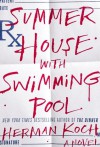In One Person
 It should be noted, before I begin, that this is the first John Irving novel I've read. I feel a bit ashamed to admit this but perhaps I wasn't meant to read a John Irving novel until now. Either way.
It should be noted, before I begin, that this is the first John Irving novel I've read. I feel a bit ashamed to admit this but perhaps I wasn't meant to read a John Irving novel until now. Either way. From what I've gathered from other reviews on the book, faithful Irving fans have been a bit disappointed with this novel. I suppose there are some reoccurring themes in In One Person that can be found in his other novels. Themes such as a setting at a New England boarding school, cross-dressing and wrestling to name a few. Naturally for me, with this being my first Irving novel I found no problems with any of the themes or the plot.
The story of In One Person is a tricky subject to tackle, it's definitely not a story for everyone. We follow the protagonist, Bill Abbot through his life starting with his teenage years in the 1950's and going through 2010. Abbot is the narrator of the story, telling the story from present day in his early seventies.
Abbot and Irving introduce to us a plethora of characters that made an impact on Abbots life in some way or another all dealing in some relation to Abbot's sexuality. The protagonist considers himself to be bi-sexual and with an absent biological father, tries to put himself together with some sort of explanation for why his is and why he feels the way he feels. The town librarian, Miss Frost quickly becomes a confidant to Abbot as a young teenager and helps guide him.
The secrecy Abbot's family keeps, the dysfunction of it all is very relatable and at times I could picture myself and my family having those conversations.
I adore books written in a timespan such as this. The last novel I read like this was Curtis Sittenfeld's American Wife-another book that spanned a fifty year setting. Only, and understandably, less sexual as In One Person.
In what I presume is Irving's style of writing, In One Person is written in the form of the nineteenth century novel. A form that is lost today and a form that deserves a good read now and again. It has been awhile since I read a good nineteenth century-styled novel.
The novel, and Irving can be summed up in the last page or so of the book, as Benjamin Svetkey from Entertainment Weekly beautifully points out:
" ...even Irving recognizes that a book about a bisexual man with a thing for guys dressed in women's clothing isn't going to be everybody's cup of tea. In the final pages, Billy the grown-up novelist is confronted by a disgruntled reader. ''I've read all your books, and I know what you do — I mean, in your writing,'' he says. ''You make all these sexual extremes seem normal.... You create these characters who are so sexually 'different,' as you might call them — or f--- ed up, which is what I would call them — and then you expect us to sympathize with them, or feel sorry for them, or something.''
''Yes,'' Billy answers, ''that's more or less what I do.''"
Ugh, perfection.







